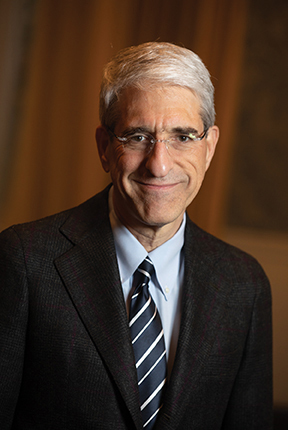
Mark Ostow
We have all faced moments when we knew we had to act: perhaps we were in the right place, or had the right skills, to solve an urgent problem. Now imagine that imperative on a much larger scale: imagine that you had the expertise and resources to save lives and reduce suffering.
Since the beginning of the COVID-19 pandemic, Yale has acted. Our scientists and scholars are solving mysteries surrounding the novel coronavirus; helping people understand the science behind public health guidance; and collecting and analyzing data to address issues like unemployment and vaccine reluctance. In the face of great challenges, Yale students, faculty, and staff are harnessing their knowledge and understanding to improve the world.
The path to ending this pandemic starts in the laboratory. A collaboration between the laboratories of Professor Akiko Iwasaki, the Waldemar Von Zedtwitz Professor of Immunobiology and Molecular, Cellular and Developmental Biology, and Caroline Johnson, assistant professor of epidemiology, has yielded new insights into why men and women sometimes experience different outcomes with COVID-19—a finding with promising implications for treating the disease. Basic science provides the foundation for translational discoveries that will save lives.
The new Yale Network for Vaccine Initiatives—led by Linda Niccolai, professor of epidemiology and director of the Connecticut Emerging Infections Program at Yale, Carlos Oliveira ’19PhD, assistant professor of pediatrics, and Marietta Vazquez ’90, professor of pediatrics—will bring together researchers from across different schools and disciplines to accelerate work on many vaccines, including ones for COVID-19. The university is home to a Phase 3 trial of the Pfizer vaccine, led by Dr. Onyema E. Ogbuagu, associate professor of medicine, and of clinical trials of potential therapies. Last year, researchers at the School of Public Health developed a saliva test, SalivaDirect, which provides a less expensive tool for detecting the virus.
Experts from the university have been front and center since the pandemic began. Albert Ko, professor of epidemiology (microbial diseases) and of medicine (infectious diseases); Howard Forman, professor of diagnostic radiology, public health (health policy), economics, and management; and Saad Omer, director of the Yale Institute for Global Health and the Susan Dwight Bliss Professor of Epidemiology of Microbial Diseases, convey important health messages to the public, and they work with local and state governments, and with Yale, to make decisions based on scientific evidence. Last spring, Edward Kaplan, the William N. and Marie A. Beach Professor of Operations Research, professor of public health, and professor of engineering, quickly developed “scratch” mathematical models that guide operations on our campus and elsewhere, and he continually updates these models based on new data. Most importantly, his models help Connecticut hospitals anticipate the need for ICU beds and prepare for an increase in patients.
Yale’s depth and breadth of expertise are paramount in addressing this crisis. Our researchers—and I have only mentioned a few of them by name—have helped the state of Connecticut expedite unemployment payments, studied the safety of childcare centers, and crunched big data sets related to lockdowns. Our epidemiologists and political scientists collaborated on large studies to understand the best ways to communicate about vaccines.
Yale’s leadership has been on display in ways that make all of us proud. Early in the pandemic, Connecticut governor Ned Lamont ’80MBA asked Indra Nooyi ’80MPPM and Dr. Albert Ko to lead the state’s reopening advisory board. Like so many alumni, Nooyi, who has served on the Yale Corporation and is the former CEO of PepsiCo, is using her skills and expertise to serve the public good during this challenging time.
And in December, Marcella Nunez-Smith ’06MHS, associate professor of internal medicine, public health, and management, was asked to lead a new White House task force dedicated to health equity. Dr. Nunez-Smith is an expert on health disparities, and she has brought national attention to the pandemic’s disproportionate impact on people of color.
The university will continue to do its part to support our community and our neighbors. As authorized by the Connecticut Department of Public Health, Yale is hosting a large vaccination clinic in the Lanman Center in Payne Whitney Gymnasium, where Yale Health staff, with the assistance of nursing students, are inoculating employees and members of Yale Health.
As one of the world’s greatest research universities, Yale has a distinct role to play in ending the COVID-19 crisis. We must continue to champion basic and translational research, create knowledge across disciplines, and address critical challenges. With your support, I know we will accomplish Yale’s vital mission—“to improve the world today and for future generations.”
 loading
loading